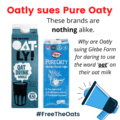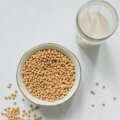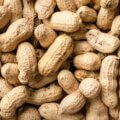I read the poster, which was shouting out “Arsenic in Rice Milk!” and decided to find out a bit more about this. If you can’t drink cow, sheep or goat milk you are left with soya, rice, oat, potato and nut milks. My general preference, purely based on taste, is rice milk – and there was me thinking I was actually making a healthy choice. If you have a dairy allergy you don’t have much choice, but generally it forces you to be healthier than others because you can’t have the cakes, biscuits and puddings, unless you cook them yourself or buy free from products.
I wanted to find out whether by drinking rice milk I was putting myself in any danger. I found out that the Foods Standards Agency have advised against small children being given rice milk after a study in 2009 identified higher than average levels of arsenic in all the leading brands of rice milk. However, for adults, the levels are so small, and still well below the recommended minimum level that it’s quite safe.
This is what the Food Standards Agency are advising:
The article, entitled “Arsenic in rice research” was written on Thursday 21 May 2009. The Agency conducted two studies: one to test arsenic levels in rice milk and the other to test methods of cooking rice in reducing the arsenic content.
“As a result of the rice drink study, the Agency recommends that toddlers and young children should not have rice drinks, often known as rice milk, as a replacement for cows’ milk, breast milk or infant formula.
The rice drink study followed concerns about results from a study published last year that measured arsenic levels in these types of drinks. The research published today examined 60 samples of rice drinks and found low levels of arsenic in all of them (there is a link to the study on the Food Standards Agency website above).
The level of total arsenic ranged from 0.010 – 0.034 milligram/kilogram and the levels of inorganic – the more harmful – form of arsenic ranged from 0.005 – 0.020 milligram/kilogram. The proportion of inorganic arsenic in
the rice drink samples ranged from 48 – 63%. None of the results were over the current legal limit.”
To read the Foods Standards Agency guidelines in full visit: “Arsenic in rice research”.
So what is arsenic?
Arsenic is a chemical element which is notorious as a deadly poison. We’ve all heard of it before and it conjures images of dastardly murder plots where the victim is knocked off with a dose of rat poison. It is also commonly found in many of the foods we eat as well as water and soil as a trace element and would be completely impossible to avoid entirely. A recent study shows that rice milk has higher than average quantities of arsenic than was previously thought, it also seems to retain more arsenic than other foods but it’s important to note that this is the organic form of arsenic. Inorganic arsenic is the more harmful and can cause cancer.
I found another interesting article on Micki Rose’s blog which has some more links for further reading.
“Arsenic in rice milk – is this true?”
A study into the arsenic levels in different brands of rice milk was conducted by the University of Aberdeen way back in 2008 so this is my no means new news. I found a useful article in Chemical Science magazine. Read “Arsenic exposure from rice milk” for more details of the research study and its results.
“Researchers have found that levels of arsenic in rice milk exceed EU and US drinking water standards.
Andrew Meharg and colleagues at the University of Aberdeen, UK, have shown that people drinking rice milk are exposed to high levels of inorganic arsenic. It is well known that rice can contain high levels of, predominately inorganic, arsenic – a known human carcinogen. However the levels of inorganic arsenic in milk made from rice, a cow milk alternative for vegans and lactose intolerant sufferers, have not previously been of concern.
Meharg’s team analysed samples of rice milk to see if inorganic arsenic transfers from the rice into the milk. They tested commercially available and home-made milks, made from globally sourced white and brown rice grains. And they also looked at arsenic levels in soy and oat milk.
EU regulations set limits on the amount of arsenic allowed in drinking water, and the US specifically limits inorganic arsenic levels. Neither closely regulates arsenic in foods, and it is not clear which category rice milk falls into.
Meharg found that all the commercial rice milks exceeded the EU limit for water and 12 out of 15 samples exceeded the US standard with the median total arsenic value being seven times greater than in soy and oat milk samples.
David Polya at the University of Manchester, UK, is an expert on the risks of environmental chemicals to humans, and says that the research highlights ‘an inconsistency in the regulatory treatment of carcinogens, such as arsenic, between food and drink. Groups particularly at risk, such as vegans, are not identified by average exposure estimates,’ he adds.
Meharg says that his research group has recently received funding to begin breeding rice plants that take up less arsenic. He also intends to characterise the bio-availability of arsenic from rice in humans to add to the evidence that this exposure route is concerning. “
So the advice from the Foods Standards Agency is that young children and babies should not be given rice milk because they consume a much higher quantity in relation to their body weight, so would be consuming far more than an adult drinking the same amount. This isn’t quite so easy if your child has a dairy allergy but there are other milk alternatives such as soya, potato, oat etc. You should consult your doctor if you are at all worried.
This article in Chemical Science is a little more concerning as it discusses whether people who are vegan, lactose intolerant and allergic to cow’s milk are at a high risk also – not just young children. You can read the full report by following the link above.
I’m not a scientist, but if we can test the milk and identify that it contains arsenic – why can’t we remove that arsenic from the rice milk? Whilst researching the internet for this article I also found information about arsenic in cow’s milk and water supplies across the world. It’s the same with all these scares – it seems there is something bad about all foods, and a corresponding good effect too. e.g. Don’t drink too much alcohol, but a glass of red wine is good for you.
Experts seem to be saying there is no risk to adults, but limiting your exposure to rice milk can’t be a bad thing. Alternate between oat, rice and soya milk and cut down on the amount of rice milk you consume. I don’t know whether this is the same for normal rice and other rice based products and puddings. Is this just another thing I should avoid on top of all the other foods I can’t eat? Or am I just panicking and being paranoid?
The human body is very adept at flushing out chemicals and metals such as mercury and arsenic, and there are minerals and supplements that help that process. Have any tests been done to see whether vegans and lactose intolerant people drinking a high level of rice milk have high levels of arsenic in their bodies? Or are we in fact processing it anyway and so it’s causing us no harm.
I have read that drinking too much soya milk could also be not such a good thing so where does it end? And if you can’t tolerate soya either you aren’t left with much choice. Read, ” Can drinking soya milk every day be bad for you?”
Confused? Me too. The two studies seem to contradict each other. Both agree that young children should not be given rice milk but they disagree on whether the rest of us should cut it out too.
What do you think? Do you drink rice milk? Should we be worried? I’m off now for a mug of hot chocolate made with rice milk and a pinch of arsenic.












I don’t find any of these tetra packed “milks” particularly digestible – they seem so “dead”. I prefer to cook short grain rice well and with plenty of water, pour off some of the liquid when nearly done and drink that – love it!
I feel SOooo much better for consuming less processed food.
Alex that’s a good idea. What does it look like? Is it tasty? You can buy rice milk makers too – but they aren’t cheap. You just put rice on one end, water in the other and hey presto. I’ll try this next time i make rice.
Yep, I think you’re paranoid. Don’t buy into scaremongering. The RSC article says “the median total arsenic value being seven times greater than in soy and oat milk samples”. Interesting if you’re scared so you know there are alternatives, but the “seven times greater” is ridiculous. One not “a millions times greater than whatever other drink that’s got almost no arsenic in it”!!! Anyway, the Japanese eat loads of rice (and fish, full of arsenic too) every day and live super old, I wouldn’t be worried.
Fred I think you’re right, and after a good nights sleep I had a nice big bowl of arsenic and rice milk porridge! Yum Yum. I try to have rice one week, then oat, don’t like soya. Never tried potato milk but it sounds horrid. I think everything in moderation is fine. The human body is am amazing thing.
The main problem with Arsenic is that the body finds it very easy to take up and difficult to get rid of, either by chemically processing it into something less toxic or by elimination with other body wastes.
Babies particularly can drink lots of milk (ours will go through a litre or so of oat milk a day – can’t have dairy) and so can accumulate significant levels in tiny increments over a long period. As babies have a lot less body mass compared to adults there is a bigger effect for babies.
Thanks Mike – only just spotted your comment here. It is worrying isn’t it? I’m drinking more oat milk instead as I’m not keen on soya milk. What about the new coconut milk. Is that OK?
I’ve been drinking rice milk for many years. I developed painful extensive neuropathy about 4 years ago and also a dodgy liver. I have now stopped drinking rice milk. The reason I give is that I will not chance anything else where my health is concerned. Arsenic effects the liver and nervous system and that is too risky for me to contemplate!
Just found this article on Micki Rose’s blog. More on arsenic in rice milk… http://mickirose.wordpress.com/2009/06/10/arsenic-in-rice-milk-%e2%80%93-is-this-true/
Just had a hair analysis on my 15 year old son. He had a dangerous amount of arsenic in his hair. He has been drinking rice milk for 10 years due to milk allergy. I feel terrible I had no idea.
Gosh that is scary. I’d not heard of this actually happening. I have to admit I’ve not been drinking rice milk much lately. I tend to buy oat milk from Oatly, Koko Coconut milk and Almond milk as I can have this. Could he also have soya milk? Plenty of choices but that is very worrying. I wonder how many people don’t get tested. and what be the effect on your son now? I hope he is OK and this reverses with avoidance of rice milk.